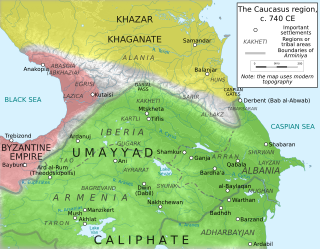Banu Abd Shams refers to a clan within the Meccan tribe of Quraysh.
Ostikan was the title used by Armenians for the governors of the early Caliphates. In modern historiography, it is chiefly used for the caliphal governors of the province of Arminiya, which included Greater Armenia.
The Banu Makhzum was one of the wealthy clans of the Quraysh. They are regarded as being among the three most powerful and influential clans in Mecca before the advent of Islam, the other two being the Banu Hashim and the Banu Umayya.

Yazīd is an Arabic name and may refer to:

Arminiya, also known as the Ostikanate of Arminiya or the Emirate of Armenia, was a political and geographic designation given by the Muslim Arabs to the lands of Greater Armenia, Caucasian Iberia, and Caucasian Albania, following their conquest of these regions in the 7th century. Though the caliphs initially permitted an Armenian prince to represent the province of Arminiya in exchange for tribute and the Armenians' loyalty during times of war, Caliph Abd al-Malik ibn Marwan introduced direct Arab rule of the region, headed by an ostikan with his capital in Dvin. According to the historian Stephen H. Rapp in the third edition of the Encyclopaedia of Islam:
Early Arabs followed Sāsānian, Parthian Arsacid, and ultimately Achaemenid practice by organising most of southern Caucasia into a large regional zone called Armīniya.
Expedition of Ibn Abi Al-Awja Al-Sulami to Banu Sulaym took place in April 629 AD, 12th Month 8AH-1st Month 9AH, of the Islamic Calendar.
Yazid ibn Asid ibn Zafir al-Sulami or Yazid ibn Usayd ibn Zafir al-Sulami was an Arab general and governor in the service of the early Abbasid Caliphate. He was active mostly in the Caliphate's northwestern frontier region, serving as governor of Arminiya and the Jazira and fighting against the Byzantine Empire and the Khazars.
The Umayyad dynasty or Umayyads was an Arab clan within the Quraysh tribe who were the ruling family of the Caliphate between 661 and 750 and later of al-Andalus between 756 and 1031. In the pre-Islamic period, they were a prominent clan of the Meccan tribe of Quraysh, descended from Umayya ibn Abd Shams. Despite staunch opposition to the Islamic prophet Muhammad, the Umayyads embraced Islam before the latter's death in 632. Uthman, an early companion of Muhammad from the Umayyad clan, was the third Rashidun caliph, ruling in 644–656, while other members held various governorships. One of these governors, Mu'awiya I of Syria, opposed Caliph Ali in the First Muslim Civil War (656–661) and afterward founded the Umayyad Caliphate with its capital in Damascus. This marked the beginning of the Umayyad dynasty, the first hereditary dynasty in the history of Islam, and the only one to rule over the entire Islamic world of its time.
Safwan ibn al-Mu'attal al-Sulami was a sahabi (companion) of the Islamic prophet Muhammad and an Arab commander in the Muslim conquests. He was one of the first members of the Banu Sulaym to embrace Islam. He was accused, allegedly by Abd Allah ibn Ubayy, of having an affair with Muhammad's wife A'isha after the two became separated from a Medina-bound caravan. Later, Safwan became a commander and moved from Medina to Basra during the Muslim conquest of that region. Afterward, he took part in the military campaigns against the Byzantines in al-Jazira and Armenia, where he is said to have been slain. However, other reports mention that he died decades later as governor of Armenia.
Abu al-A'war Amr ibn Sufyan ibn Abd Shams al-Sulami, identified with the Abulathar or Aboubacharos of the Byzantine sources, was an Arab admiral and general, serving in the armies of the Rashidun caliphs Abu Bakr, Umar and Uthman rejecting the fourth Rashidun caliph Ali, instead serving Umayyad caliph Mu'awiya I.
Abu'l Fatḥ al-Ḥasan ibn ʿAbd Allāh ibn Aḥmad ibn ʿAbd al-Jabbār ibn al-Ḥaṣīna al-Sulamī better known as Ibn Abī Ḥaṣīna, was an 11th-century Arab poet, who specialized in panegyrics. He benefited from the patronage of the Mirdasid dynasty, whose emirs (princes) he frequently praised in his poetry. His works were published as Diwan Ibn Abi Hasina in 1956.
Humayd ibn Hurayth ibn Bahdal al-Kalbi was a senior Umayyad commander and a chieftain of the Banu Kalb tribe. He was head of the shurṭa under caliphs Marwan I and Abd al-Malik, and may have served in the same capacity under their predecessor Caliph Yazid I. He commanded the Kalbi-dominated shurṭa in the Battle of Khazir in 686, and a year later joined the rebellion of the Umayyad prince Amr ibn Sa'id ibn al-As against Abd al-Malik. After the revolt's failure, Humayd reconciled with the latter. In the years following the battles of Marj Rahit (684) and Khazir, Humayd led the Kalb in numerous tit-for-tat raids and battles with enemy Qaysi tribes, including the Banu Amir, Banu Sulaym and Fazara.
ʿUmayr ibn al-Ḥubāb al-Sulamī was a chieftain of the Banu Sulaym tribe, an erstwhile Umayyad general and a main leader of the Qaysi tribes in the factional wars with the Banu Kalb and Taghlib.

Abu Marwan Bishr ibn Marwan ibn al-Hakam was an Umayyad prince and governor of Iraq during the reign of his brother, Caliph Abd al-Malik. Bishr fought at Marj Rahit with his father, Caliph Marwan I. Marwan posted Bishr to Egypt to keep his brother Abd al-Aziz company. In 690/91, Bishr was made governor of Kufa and about one year later, Basra was added to his governorship, giving him full control of Iraq.

ʿAbd Allāh ibn Khāzim al-Sulamī was the Umayyad governor of Khurasan between 662 and 665 and again in late 683, before becoming the nominal Zubayrid governor of the same province between 684 and his death.

Abū Ḥarb Salm ibn Ziyād ibn Abīhi was a general and statesman of the Umayyad Caliphate, who later defected to the caliphate of Abd Allah ibn al-Zubayr during the Second Muslim Civil War before returning to the Umayyads' ranks. Salm was appointed by Caliph Yazid I as the governor of Khurasan and Sijistan in 681. During the course of his governorship, he launched several expeditionary raids into the Central Asian regions of Transoxiana, including Samarkand, and Khwarazm. His successes and generous distribution of war booty among his Khurasani Arab troops gained him wide popularity with them, but after Yazid died, Salm was not able to maintain their loyalty to the Umayyads for long. After his troops and chosen successor, Abd Allah ibn Khazim al-Sulami, gave their allegiance to the rival caliphate of Abd Allah ibn al-Zubayr, Salm made for Basra. There, he ultimately joined Ibn al-Zubayr's camp, but was imprisoned in Mecca by the latter nonetheless. After paying a large bribe, he was released and following Ibn al-Zubayr's death at the hands of the Umayyads in late 692, he was reappointed the governor of Khurasan. However, he died before he could resume his duties.
Khalid ibn Abdallah ibn Khalid ibn Asid was an Umayyad prince and statesman who served as governor of Basra in 692–693 during the reign of Caliph Abd al-Malik.
Qays ibn al-Haytham al-Sulamī was an Arab commander and administrator in the service of the Rashidun, Umayyad and Zubayrid caliphates. Under the caliphs Uthman and Mu'awiya I he served at time as the sub-governor of Khurasan and the cities of Nishapur and Marw al-Rudh. He was from a prominent Arab family in Basra and was a leader among the tribal nobility of that city until his death after 684.
Taym Allah, known as Taym Allat in the pre-Islamic period or before their conversion to Christianity, were an Arab tribe in eastern Arabia and the lower Euphrates valley, belonging to the Banu Bakr confederation. They were a relatively minor branch and most of their pre-Islamic history pertains to their role in the Lahazim alliance of Bakrite tribes in the alliance's conflicts with the Tamim tribe and the Lakhmids, the main Arab vassals of the Sasanian Empire. They fought against the Muslims during the conquest of Iraq, but afterward embraced Islam and eventually, a number of their tribesmen held important military positions in the eastern provinces of the Caliphate. A small section of the tribe settled the Wadi al-Taym valley, which is called after them, in modern Lebanon.
Aslam ibn Zurʿa ibn ʿAmr ibn Khuwaylid al-Ṣāʿiq al-Kilābī was a prominent Arab chieftain of the Qays tribal faction in Basra and Khurasan and served as the governor of Khurasan in 675 and 677–679. In the period between his two terms, he continued to wield significant influence in the province alongside the governor Sa'id ibn Uthman. Unlike his predecessors and many of his successors, Aslam did not undertake further conquests from the Khurasan frontier into Transoxiana. Regarding possession of war booty and tribute, he consistently defended the interests of the Arab tribesmen in Khurasan, who made up the core of the Umayyad Caliphate's forces there and insisted on controlling the funds due to the high costs of their military activity, against the demands of the central government in Syria. Aslam was known to have imposed heavy taxation on the population of Khurasan. He was arrested by Qays ibn al-Haytham al-Sulami, who extracted from him 300,000 silver dirhams. Aslam was later dispatched to suppress a small Kharijite force in Ahwaz in 680/81, but was defeated. His son Sa'id and grandson Muslim also held high office.




